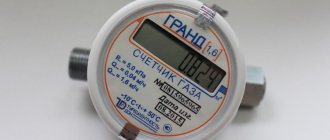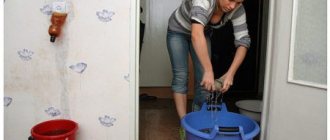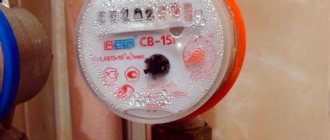Emergency phone
It is important to know where to call when there is a water leak. The purpose of the phone call is to notify the emergency repair team that an accident has occurred as soon as possible. Such units are organized in all housing management companies and city utilities. An accident occurs at any time of the day or night, which is why the numbers available for contact are divided into 24-hour telephone numbers and telephone numbers that operate only during working hours - for the bulk of workers.
To answer the question of where to call if a pipe has burst in your apartment, it is important to have an idea of which organizations are involved in emergency response. The call will certainly be answered and appropriate measures :
- ZhES - housing maintenance service will help if a water pipe or heating rupture occurs during working hours on a weekday. The telephone number is on the door of each entrance.
- The emergency service of the water utility accepts requests for an urgent call to a brigade during a water main break on weekends and holidays around the clock. There is a hotline for this.
- Dispatch service of the management organization for the property of the house - the scope of its service includes all pipes and heating radiators in the apartments of the controlled building. On weekends and holidays, office managers do not work and their telephone numbers are unavailable.
- The city emergency service will also send specialists upon call to eliminate the flooding of the entrance and basement - the signal will be documented and will become evidence in court, if necessary.
- The service organization works under an agreement with the management company and has its own dispatch service. If even minor leaks are detected on the riser in the bathroom or on the radiator, the homeowner must contact the agency so that a major accident does not occur.
Heating system failure: where to turn?
When the battery breaks, our company will tell you where to call: dial the phone and indicate the address - a team of specialists will immediately go to the site.
Accidents of heating systems can be intra-apartment or intra-house; each of them has its own design scheme, so this nuance should be indicated when reporting an accident. While the team is traveling to the site, it is necessary to turn off the coolant supply to the riser of your apartment. As a rule, this can be done in the basement of a house (in multi-story buildings), or in a private building - in the boiler room. This way you can stop the flow of water to the broken pipe and the damage from the accident will be minimal.
Sequence of actions
Sometimes in an extreme situation a person gets lost: if a heating pipe in an apartment bursts, what should you do first? You need to send an SOS distress signal, and not try to plug the hole. It’s good when several people are present and responsibilities can be distributed. One contacts the emergency service, the other tries to localize the leak, and the third will notify the neighbors at this time. If you had to deal with the problem yourself, then the order of measures taken is as follows:
- see the location of the breakthrough if there is an accident in your own apartment, or note that the upstairs neighbor is drowning;
- call the emergency service and provide your address, identify the problem, find out the time of arrival of the team;
- notify neighbors, and, if there is a valve on the riser in the basement, try to close it or reduce the leak with available materials and tools;
- Having stopped the flooding, collect water indoors, record the situation through photography and video - this will help when going to court for reimbursement of the costs of restoring damaged property.
Application review period
Your appeal about the accident must be considered on the day it is received, and the management company is obliged to eliminate the problem within 24 hours. In cases where the necessary equipment is not available or other obstacles arise, the applicant must be informed immediately. This rule also applies to applications received by telephone. Requests to the emergency service related to residential safety are resolved as a matter of urgency.
Form of an apartment flood report
Emergency measures in the event of an accident
There is no reason to remain idle while waiting for the emergency crew to arrive. If you are unable to shut off the riser, you can try to stop the water yourself :
- Apply a clamp with a rubber base: a bicycle tube, a tourniquet, or a glove are suitable for this. Cover the fistula with elastic material, wrap it with thick cloth and secure it with a knot.
- You can limit leakage by using a clamp with the same base, but making it from tin, fastening it with screws or screws.
When working with hot water, use gloves to prevent burns. It is necessary to place containers under the jets that could not be contained - they will reduce the damage caused.
What to use to seal a leak
Depending on the nature of the damage, a radiator leak can be eliminated in different ways.
All of them are available to the home master:
- restoring the tightness of the system by welding;
- use of a cement-plaster cast;
- wrapping the problem area with FUM tape (fluoroplastic sealing material);
- use of moisture-resistant glue;
- squeezing the fistula with a gasket and a clamp;
- making a cold-welded seal or sealant to eliminate a leak.
With minor damage, it is quite possible to cope with the problem yourself. To do this you will need certain materials, tools and some free time.
Prices for sealant to fix leaks
sealant for sealing leaks
The culprit of the pipe burst
If a pipe bursts in an apartment, who is to blame cannot be answered right away; we need to figure it out. Upon completion of the flood liquidation, the emergency team that arrived upon the call draws up a report, which indicates the specific location of the leak: an apartment or a common building riser, and the considerations of the commission members about the cause of the leak. It is possible to determine the culprit of the accident only taking into account all the circumstances of the rupture. Here are some situations :
- The owner of the emergency apartment flooded the neighbor from below - the Civil Code indicates the guilt of the residents of the upper room. But this is ambiguous, since the cause could be a low-quality radiator purchased in a store and certified by a sales receipt. The pipe may turn out to have a manufacturing defect, which will always be proven by an independent examination. Installation is also sometimes carried out with errors, and then the relevant company or individual is held liable.
- The accident occurred in a municipal apartment - the maintenance of heating and sewage systems is the responsibility of the management company or housing office, on whose balance sheet the house is located. If a rusty pipe is destroyed, it means that the housing office did not carry out routine or repair work in good faith and must carry out restoration in both apartments: above and below, at its own expense. It’s another matter if the tenant of the emergency room independently replaced the cast-iron batteries with aluminum ones, then he will be guilty. A similar situation will occur if the tenant prevented utility workers from conducting preventive inspections.
- The heating riser is a common house system and is under the supervision of the housing office. In this case, the blame will definitely fall on the operating company.
Limits of responsibility of the management company
Note! To establish the limits of liability of the management company, you should refer to Article No. 36 of the Housing Code and Government Decree No. 491 of August 13, 2006 (as amended on March 26, 2014). It follows from them that the management company’s responsibility for emergencies arising from a breakdown in communications of heating, water supply and sanitation systems extends to networks located up to the point of connection of intra-apartment pipelines with a common riser.
What should the owner or tenant repair at their own expense? Let's be clear on this point. According to the above law, the management company is not obliged to repair this equipment:
- Electric stove, gas stove;
- Plumbing equipment;
- Gas, water, electricity consumption meters;
- Intercom;
- Heating radiators;
- Electrical fittings, cables.
If we are talking about water supply, sewerage, and heating networks, then the boundary of responsibility of the management company passes through these areas:
- Gas supply system - the area up to the shut-off element for connecting to the gas stove;
- Drainage system - the section up to the point of insertion of the drainage pipelines into the common riser, leading to the sink or other drainage points;
- Water supply system - up to the threaded connection with the metering meter outlet pipeline from the riser;
- Heating system - up to the threaded connection of pipelines with heating radiators.
Thus, it can be emphasized that your management company is obliged to maintain free of charge the common risers of communications, as well as sections of the branch and discharge of pipelines from them to the above boundaries.
Note! Telephone numbers of specialists and services involved in emergency response are usually recorded in the house telephone book. If there is not one, you should go downstairs to the front door and find a notice board there. Usually there are telephone numbers of specialists involved in servicing your home.
The heating battery is leaking
If the battery in your home is leaking, you need to take immediate action. First, find out where the leak occurred, and if possible, fix the defect yourself.
Otherwise, call a specialist who will quickly fix the breakdown or carry out repairs.
Batteries are leaking, what should I do? – many homeowners who are faced with a problem are interested.
This is a rather unpleasant, but at the same time common breakdown. The main reason is the aging of metal pipes and corrosion processes that destroy the metal.
In some cases, a leak occurs when the connections are installed incorrectly, as well as in a situation where there is a significant load on the heating system.
In order to objectively and adequately solve the problem, you should follow a certain sequence of actions that will save your apartment and neighbors’ property from a lot of damage. Here you should not forget about health safety, since hot water circulating in radiators can seriously burn you.
Who is to blame for the accident?
After the accident is localized, a debriefing begins and the search for those to blame begins. The management company will not always be responsible for the accident: the owner of the apartment may be to blame.
There is no need to try to fix something yourself; your task is to collect water in a container, preventing it from getting on the floor, and wait for specialists
If you did not replace the heating pipes or batteries yourself, the blame falls on the HOA.
If you did something with the heating system yourself without the participation of the HOA (for example: changing a battery or faucet), and a breakthrough occurred at the place of work, then you will most likely be blamed.
Surprisingly, but true: if you did something with the heating system without the participation of the HOA, but the accident occurred for completely different reasons (not your fault), you may still be at fault.
The heating battery is leaking, who should repair it?
» »
Sooner or later, apartment owners in apartment buildings are faced with the question of replacing heating batteries. It's no secret that the heating system in old houses is quite worn out.
This often leads to various emergency situations.
Utility services undertake repairs much more often after breakdowns, but do not want to do preventive maintenance of the system before the heating season. In order to understand once and for all who exactly should be involved in repairing and replacing worn-out radiators in privatized housing, we must figure out who owns the heating system of an apartment building as a whole.
In 2006, the Russian Government adopted a resolution on what property belongs to the common property of the house. This document notes that the entire heating system located in the house is common property.
At whose expense is the heating battery in the apartment replaced through the housing office?
If the apartment has old radiators, then replacing them will cost a decent amount. At whose expense should the batteries in the owners' apartments be replaced, and who will be responsible in the event of an emergency after a leak?
We will tell you in the article how to replace the heating battery in an apartment through the housing office. Is it possible not to pay rent, and what happens if debt accumulates?
Find out the answer right now. Radiators - common or personal property? The issue of property ownership of heating devices in an apartment is complex.
In accordance with Part 1 of Art. 36 of the Housing Code of the Russian Federation, plumbing and other equipment are considered common goods in apartment buildings, but only on the condition that this equipment serves more than one room. Part 1 of Art. says the same. 290 Civil Code of the Russian Federation. RF PP dated August 13, 2006 No. 491, Rules for the maintenance of common property in apartment buildings were introduced into the rank of legislative act, so in paragraph.
6 of these Rules... specified,
First measures to eliminate emergency situations
If a break in the sewer or water supply or heating pipes does occur in your apartment, you need to take a number of measures to temporarily eliminate the leak before the specialist arrives. Let's look at them.
Installing a rubber tie
Installation of rubber trim
Almost any rubber product is suitable as a tightening, including medical tourniquets, bicycle inner tubes, etc. First, you need to tightly wrap the leak area with this product, then place a metal self-tightening clamp on top of it and tighten it until it clicks.
Installation of self-tapping screw
Note! This method can only be used when repairing new pipes due to the fact that when cutting threads in old pipes, destruction of the metal is possible.
For this method you will need:
- self-tapping screw with press washer,
- drill,
- metal drill,
- nozzle for cutting threads in metal.
In the place where the pipe has burst, you need to drill a hole in the pipe with a drill to the diameter of the self-tapping screw, then, changing the nozzle, cut the thread. After that, screw in the self-tapping screw. This method is good for eliminating water pressure leaks.









